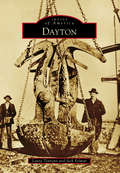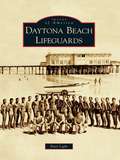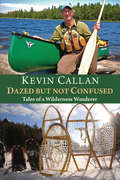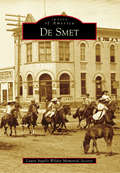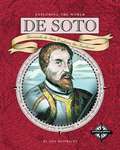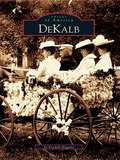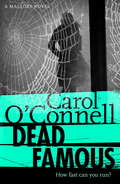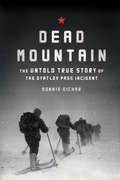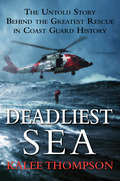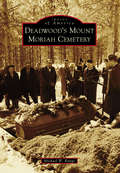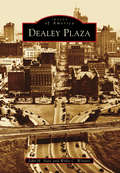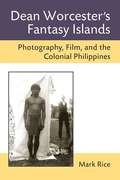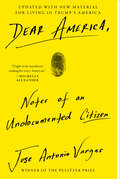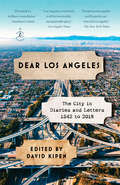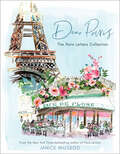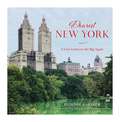- Table View
- List View
Days on the Road: The Diary of Sarah Raymond Herndon
by Sarah Raymond HerndonSarah Raymond was an unmarried woman of twenty-four who in May 1865--barely a month after the end of the Civil War--mounted her beloved pony and headed west alongside the wagon carrying her mother and two younger brothers. They traveled by wagon train over the Great Plains toward the Rocky Mountains, with no certain idea of where they would settle themselves but a strong desire to leave war-torn Missouri behind and start a new life. Days on the Road is the story of this remarkable journey and of the young woman who made it. Written on the trail and originally published in 1902, it is a tribute to all of the emigrants who made their way west and the tale of a truly extraordinary woman.
Dayton (Images of America)
by Jack Folmar Laura TennantDayton's history begins with Nevada's first gold discovery in July 1849. It started with a California-bound pack train, led by trail guide Abner Blackburn, setting up camp at the mouth of a canyon that drained into the Carson River. While waiting for the snow to melt in the Sierra, Blackburn went prospecting and dug gold from the creek bed. The news of his discovery spread, and prospectors rushed to the site they called Gold Cañon--today's Dayton. In May 1851, diarist Lucena Pfuffer Parsons, traveling with a wagon train, camped at the site and reported about 200 miners living in the canyon. She noted that they were finding enough gold to trade for supplies. In 1859, after working their way up the canyon, miners discovered a large silver and gold deposit known as the Comstock Lode. This discovery led Nevada to statehood in 1864.
Daytona Beach Lifeguards (Images of America)
by Patti LightOn May 22, 1931, the American National Red Cross issued its second charter for a life preserving organization to the Daytona Beach Red Cross Life Saving Corps. Composed of 30 young men aged 17 to 26 and trained in lifesaving and first aid, this volunteer corps protected 3 miles of beach, compiling daily records of the number of bathers, weather, first aid, and rescues. The neighboring communities of Ormond Beach and New Smyrna Beach maintained their own lifesaving units, and Volusia County monitored the remaining coastline. By 1972, these four corps had united, and the Volusia County Beach Patrol became one of the nation's most highly trained surf lifesaving rescue units. Protecting 47 continuous miles of Atlantic coastline, which holds the dubious honor of the shark bite capital of the world, the Volusia County Beach Patrol welcomes 10 million visitors and performs an average of 3,000 rescues annually.
Dazed but Not Confused: Tales of a Wilderness Wanderer
by Kevin Callan James RaffanA collection of adventures (and misadventures) spent travelling in the wilderness. Kevin Callan presents his best adventures – and misadventures – in the wilderness. Entertaining, yet enlightening, the stories are full of enthusiasm and are designed to get people to explore the wilderness on their own, and it’s hoped, be inspired to protect what’s still left. These captured moments of a life spent traveling in secluded areas and promoting their importance to all of us aren’t just for outdoorsy types. The stories relate to a much broader audience: readers who have pondered sleeping under the stars or paddling a canoe across a calm lake or down wild rapids, or even venturing into the winter woods. After reading this book, they’ll want to pack up and go the very next day.
De Smet
by Laura Ingalls Wilder Memorial SocietyHordes of pioneers moved west at a time when Dakota Territory was still unsettled. When the railroad came to town, this land of opportunity soon became a small town called De Smet. Through the years, muddy streets and wooden shacks were replaced with brick and mortar, and the little town grew into a county seat. The hallmark of De Smet comes from the pen of Laura Ingalls Wilder, when she wrote five of her Little House books set in the community. Ensuing years saw the demolition of several of De Smet's heritage buildings, but others remain today, and the validity of these structures bring untold numbers to view them. Long-standing traditions, such as Old Settler's Day, have remained within the borders of the community and are still an exciting part of the town's history.
De Soto: Hernando De Soto Explores the Southeast (Exploring the World)
by Ann HeinrichsA biography of the sixteenth-century Spaniard who explored Florida and other southern states, and became the first white man to cross the Mississippi River.
DeKalb (Images of America)
by Jo Fredell HigginsDeKalb was originally known as Huntley's Grove, named after Russell Huntley, an early settler who was one of its founders. The area had also been known as Buena Vista and DeKalb Center, before settling on the name DeKalb in 1881. The name was derived from Baron Johann DeKalb (1721-1780), a German soldier who served under Washington at Valley Forge and died a Revolutionary War hero. Three august DeKalb men are credited with the invention of barbed wire and began manufacturing it in 1873. Today DeKalb is a world leader in hybrid seed development and genetic research, as well as the home of Northern Illinois University.
Dead Famous
by Carol O'ConnellMallory Book 7: the seventh NYPD detective Kathy Mallory novel from New York Times bestseller Carol O'Connell, master of knife-edge suspense and intricate plotting.Meet Detective Kathy Mallory. New York's darkest. You only underestimate her once.The jury must die...It's the highest profile acquittal in recent history - and when a serial killer starts taking justice into his own hands, interest hits fever pitch.NYPD detective Kathy Mallory finds herself in a race against time to save the remaining three members of the jury before the Reaper gets to them first.And before the radio shock-jock Ian Zachary plays the next round in his deadly ratings-grabbing game of 'hunt the juror'.Only a monster can play this gameThis book was originally published in the UK under the title THE JURY MUST DIE.
Dead Mountain: The Untold True Story of the Dyatlov Pass Incident
by Donnie EicharThe New York Times and Wall Street Journal Nonfiction Bestseller that explores the gripping Dyatlov Pass incident that took the lives of nine young Russian hikers in 1959.What happened that night on Dead Mountain?In February 1959, a group of nine experienced hikers in the Russian Ural Mountains died mysteriously on an elevation known as Dead Mountain. Eerie aspects of the mountain climbing incident—unexplained violent injuries, signs that they cut open and fled the tent without proper clothing or shoes, a strange final photograph taken by one of the hikers, and elevated levels of radiation found on some of their clothes—have led to decades of speculation over the true stories and what really happened.Dead Mountain: The Untold True Story of the Dyatlov Pass Incident delves into the untold story through unprecedented access to the hikers' own journals and photographs, rarely seen government records, dozens of interviews, and author Donnie Eichar's retracing of the hikers' fateful journey in the Russian winter.An instant historical nonfiction bestseller upon its release, this is the dramatic real story of what happened on Dead Mountain.GRIPPING AND BIZARRE: This is a fascinating portrait of young adventurers in the Soviet era, and a skillful interweaving of the hikers' narrative, the investigators' efforts, and the author's investigations. Library Journal hailed "the drama and poignancy of Eichar's solid depiction of this truly eerie and enduring mystery."FOR FANS OF UNSOLVED MYSTERIES: Unsolved true crimes and historical mysteries never cease to capture our imaginations. The Dyatlov Pass incident was little known outside of Russia until film producer and director Donnie Eichar brought the decades-old mystery to light in a book that reads like a mystery.FASCINATING VISUALS: This well-researched volume includes black-and-white photographs from the cameras that belonged to the hikers, which were recovered after their deaths, along with explanatory graphics breaking down some of the theories surrounding the mysterious incident.Perfect for:Fans of nonfiction history books and true crimeAnyone who enjoys real-life mountaineering and survival stories such as Into Thin Air, Buried in the Sky, The Moth and the Mountain, and Icebound: Shipwrecked at the Edge of the WorldReaders seeking Cold War narratives and true stories from the Soviet era
Deadliest Sea
by Kalee ThompsonSoon after 2:00 A.M. on Easter morning, March 23, 2008, the fishing trawler Alaska Ranger began taking on water in the middle of the frigid Bering Sea. While the first mate broadcast Mayday calls to a remote Coast Guard station more than eight hundred miles away, the men on the ship's icy deck scrambled to inflate life rafts and activate the beacon lights, which would guide rescuers to them in the water. By 4:30 A.M., the wheelhouse of the Ranger was just barely visible above the sea's surface, and most of the forty-seven crew members were in the water, wearing the red survival suits--a number of them torn or inadequately sized--that were supposed to keep them from freezing to death. Every minute in the twenty-foot swells was a fight for survival. Many knew that if they weren't rescued soon, they would drown or freeze to death.Two Coast Guard helicopter rescue teams were woken up in the middle of the night to save the crew of the Alaska Ranger. Many of the men thought the mission would be routine. They were wrong. The helicopter teams battled snow squalls, enormous swells, and gale-force winds as they tried to fulfill one guiding principle: save as many as they could. Again and again, the helicopters lowered a rescue swimmer to the ocean's surface to bring the shipwrecked men, some delirious with hypothermia, some almost frozen to death, back to the helicopter and to safety. Before the break of dawn, the Coast Guard had lifted more than twenty men from the freezing waves--more than any other cold-water Coast Guard rescue in history.Deadliest Sea is a daring and mesmerizing adventure tale that chronicles the power of nature against man, and explores the essence of the fear each man and woman must face when confronted with catastrophe. It also investigates the shocking negligence that leads to the sinking of dozens of ships each year, which could be prevented and makes commercial fishing one of the most dangerous occupations in the world.With deft writing and technical knowledge, veteran journalist Kalee Thompson recounts the harrowing stories of both the rescuers and the rescued who survived the deadly ordeal in the Bering Sea. Along the way, she pays tribute to the courage, tenacity, and skill of dedicated service people who risk their own lives for the lives of others.
Deadwood's Mount Moriah Cemetery (Images of America)
by Mike RungeNestled on a mountainous plateau overlooking Deadwood’s downtown core district is one of the premier historic cemeteries in Black Hills: Mount Moriah Cemetery. Established in 1878, this cemetery contains some of North America’s most recognized Western legends, including James Butler “Wild Bill” Hickok, Martha “Calamity Jane” Canary, Seth Bullock, John “Potato Creek Johnny” Perrett, and Henry Weston “Preacher” Smith. They represent a small portion of the more than 3,600 people buried in Mount Moriah whose memories have been carved, chiseled, and etched into the monuments within this cemetery. Deadwood’s Mount Moriah Cemetery is a combination of historic and contemporary photographs chronicling the history of the cemetery and the stories of the individuals—both colorful and illustrious—who helped carve Deadwood into the annals of the American West.
Dealey Plaza
by John H. Slate Willis C. WintersDealey Plaza is famous for many things, both locally and nationally. Considered "the front door of Dallas," the park rests on a bluff near the Trinity River, where Dallas's founder, John Neely Bryan, identified a natural low-water crossing in 1841. This ford was the site of Bryan's cabin and was also the site of the first ferry and bridge over the Trinity River. Home to several Dallas County buildings and other historic structures, Dealey is not just the birthplace of Dallas; it is also the site of Dallas's first large-scale city planning solution, a traffic diverting triple underpass, and a beautiful downtown park built in the 1930s. The park was launched into national history when Pres. John F. Kennedy was assassinated here on November 22, 1963. Today, the site is visited by over two million annually. To preserve Dealey Plaza and its surrounding buildings, the federal government designated it a National Historic Landmark District in 1993.
Dealing with the Dragon: A Year in the New Hong Kong
by Jonathan FenbyWhat the new Hong Kong is like.
Dean Worcester's Fantasy Islands: Photography, Film, And The Colonial Philippines
by Mark RiceDean Worcester’s Fantasy Islands brings to life one of the most significant (but under examined) figures in the history of U. S. colonialism in the Philippines. Upon the outbreak of the Spanish-American War, Worcester, a scientist who had traveled twice to the Philippines on zoological expeditions, established himself as one of America’s leading experts on the Philippines. Over a fourteen-year career as a member of the U. S. colonial regime, Worcester devoted much of his time and energy to traveling among and photographing non-Christian minority groups in the Philippines. He amassed an archive of several thousand photographs taken by him or by government photographers. Worcester deployed those photographs in books, magazine articles, and lectures to promote his belief that the United States should maintain control of the Philippines for decades to come. While many historians have examined American colonial photography in the Philippines, this book is the first lengthy treatment of Worcester’s role in shaping American perceptions of the Philippines in the early twentieth century.
Dear Alyne: My Years as a Married Virgin
by Alyne TamirFrom world traveler, entrepreneur, and content creator @DearAlyne, a vulnerable and hilarious memoir of how she escaped the restrictive expectations of her family and faith and found herself in the process.Alyne Tamir was raised to live her life for others: for her husband, her family, and the Mormon church. For twenty-five years, she put them ahead of herself, repressing things that didn’t fit the neat, traditional story that had been written for her. On the surface, her life seemed picture-perfect. But in reality, Alyne was miserable, struggling to reconcile her flawless image with the pain and humiliation of abuse, an eating disorder, infidelity, and depression.Until Alyne reached a breaking point: the day her husband asked for a divorce—over email. Thank God! Or, not God. Finally free from the expectations of her family and faith, Alyne had to start a new life, which meant rediscovering herself and what she secretly wanted all along: the liberating life of a digital nomad.In a singular voice brimming with honesty and humor, Alyne invites us on a journey of strength and self-discovery—with a little bit of irreverence along the way. Dear Alyne is a one-of-a-kind, coming-of-age story and a testament to the limitless possibilities that await those brave enough to defy convention.
Dear America: Notes of an Undocumented Citizen
by Jose Antonio VargasTHE NATIONAL BESTSELLER“This riveting, courageous memoir ought to be mandatory reading for every American.” —Michelle Alexander, New York Times bestselling author of The New Jim Crow“l cried reading this book, realizing more fully what my parents endured.” —Amy Tan, New York Times bestselling author of The Joy Luck Club and Where the Past Begins“This book couldn’t be more timely and more necessary.” —Dave Eggers, New York Times bestselling author of What Is the What and The Monk of MokhaPulitzer-Prize winning journalist Jose Antonio Vargas, called “the most famous undocumented immigrant in America,” tackles one of the defining issues of our time in this explosive and deeply personal call to arms.“This is not a book about the politics of immigration. This book––at its core––is not about immigration at all. This book is about homelessness, not in a traditional sense, but in the unsettled, unmoored psychological state that undocumented immigrants like myself find ourselves in. This book is about lying and being forced to lie to get by; about passing as an American and as a contributing citizen; about families, keeping them together, and having to make new ones when you can’t. This book is about constantly hiding from the government and, in the process, hiding from ourselves. This book is about what it means to not have a home.After 25 years of living illegally in a country that does not consider me one of its own, this book is the closest thing I have to freedom.”—Jose Antonio Vargas, from Dear America
Dear Emmie Blue: The gorgeously funny and romantic love story everyone’s talking about!
by Lia Louis'Sweet, sparkling and heartwarming' LINDSEY KELK'The British Marian Keyes' LAURA PEARSON'A delightful story... You will love Dear Emmie Blue!' JODI PICOULT'A sweet, poignant tale of love and friendship. I loved it' BETH O'LEARY'The new Eleanor Oliphant. I loved every moment' BELLA OSBORNE'Funny, clever and romantic' STACEY HALLS'My heart felt too big for my chest the entire time' LOUISE O'NEILL'Beautifully captures the heartache. Loved it' ANSTEY HARRISEmmie Blue has a secret...A long time ago, Emmie Blue released a red balloon with a secret message hidden inside - and against all odds, across hundreds of miles of ocean, it was found on a beach in France by a boy called Lucas.Fourteen years later, on the eve of her thirtieth birthday, Emmie hopes that Lucas is finally about to kiss her. She never expected him to announce that he was marrying someone else!Suddenly Emmie's dreams are shattered and the one person in her life she can rely on is slipping through her fingers. But what if Lucas isn't her forever? What if her love story is only just beginning...Don't miss the love story that everyone is talking about this summer! Perfect for fans of Beth O'Leary, Josie Silver and Cecelia Ahern.
Dear Exile: The True Story of Two Friends Separated (for a Year) by an Ocean
by Hilary Liftin Kate MontgomeryA funny and moving story told through the letters of two women nurturing a friendship as they are separated by distance, experience, and time. Close friends and former college roommates, Hilary Liftin and Kate Montgomery promised to write when Kate's Peace Corps assignment took her to Africa. Over the course of a single year, they exchanged an offbeat and moving series of letters from rural Kenya to New York City and back again. Kate, an idealistic teacher, meets unexpected realities ranging from poisonous snakes and vengeful cows to more serious hazards: a lack of money for education; a student body in revolt. Hilary, braving the singles scene in Manhattan, confronts her own realities, from unworthy suitors to job anxiety and first apartment woes. Their correspondence tells--with humor, warmth, and vivid personal detail--the story of two young women navigating their twenties in very different ways, and of the very special friendships we are sometimes lucky enough to find.
Dear Los Angeles: The City in Diaries and Letters, 1542 to 2018
by David KipenA rich mosaic of diary entries and letters from Marilyn Monroe, Cesar Chavez, Susan Sontag, Albert Einstein, and many more, this is the story of Los Angeles as told by locals, transplants, and some just passing through.“Los Angeles is refracted in all its irreducible, unexplainable glory.”—Los Angeles Times The City of Angels has played a distinct role in the hearts, minds, and imaginations of millions of people, who see it as the ultimate symbol of the American Dream. David Kipen, a cultural historian and avid scholar of Los Angeles, has scoured libraries, archives, and private estates to assemble a kaleidoscopic view of a truly unique city. From the Spanish missionary expeditions in the early 1500s to the Golden Age of Hollywood to the strange new world of social media, this collection is a slice of life in L.A. through the years. The pieces are arranged by date—January 1st to December 31st—featuring selections from different decades and centuries. What emerges is a vivid tapestry of insights, personal discoveries, and wry observations that together distill the essence of the city. As sprawling and magical as the city itself, Dear Los Angeles is a fascinating, must-have collection for everyone in, from, or touched by Southern California. With excerpts from the writing of Ray Bradbury • Edgar Rice Burroughs • Octavia E. Butler • Italo Calvino • Winston Churchill • Noël Coward • Simone De Beauvoir • James Dean • T. S. Eliot • William Faulkner • Lawrence Ferlinghetti • Richard Feynman • F. Scott Fitzgerald • Allen Ginsberg • Dashiell Hammett • Charlton Heston • Zora Neale Hurston • Christopher Isherwood • John Lennon • H. L. Mencken • Anaïs Nin • Sylvia Plath • Ronald Reagan • Joan Rivers • James Thurber • Dalton Trumbo • Evelyn Waugh • Tennessee Williams • P. G. Wodehouse • and many moreAdvance praise for Dear Los Angeles“This book’s a brilliant constellation, spread out over a few centuries and five thousand square miles. Each tiny entry pins the reality of the great unreal city of Angels to a moment in human time—moments enthralled, appalled, jubilant, suffering, gossiping or bragging—and it turns out, there’s no better way to paint a picture of the place.”—Jonathan Lethem“[A] scintillating collection of letters and diary entries . . . an engrossing trove of colorful, witty insights.”—Publishers Weekly (starred review)
Dear New York
by Brandon StantonTHE INSTANT NEW YORK TIMES BESTSELLERThe inspiration for the groundbreaking Grand Central Station installation, Dear New York is a love letter to the streets, stories, and souls that define the heart of the city and its people―from the #1 bestselling author of Humans of New York and one of the great storytellers of our time.Creator of the global sensation “Humans of New York” and author of four #1 New York Times bestsellers, Brandon Stanton has shown us a unique side of our communities, our neighbors, and ourselves. Now, he takes us further and deeper than he’s ever gone before.Beginning with a deeply moving prologue that reads like a train ride through the city, the book opens up into a sweeping view of the city with hundreds of portraits and stories from every corner of the city, a new discovery on every page.Embracing all five boroughs, Dear New York is a book filled with contradictions, yet brimming with life. It is an unprecedented portrait of the world’s greatest city, and a personal tribute to the people who provide its soul.
Dear New York, I Love You: An Artist's Celebration of the City
by Ria SimEnjoy 120 colorful sketches that remind even the most jaded New Yorkers to notice the city’s simple beauties. Ria Sim, the creator of the popular Instagram account @coffeecakescafe, might be New York City’s biggest fan. She herself describes New York City as her soulmate (though it started out as just a crush when she lived in the Bay Area). Now a full-time Manhattan resident, Ria sees the best in the city: she’s moved by the simplicity of the buildings against the sky, a single flower on a not-so-clean sidewalk, and the ever-rotating, meticulously curated decorations adorned on a brownstone in the West Village. She draws everything from local landmarks like Joe’s Pizza and the Stonewall Inn to strangers’ doorsteps and snow-covered yellow cabs. Dear New York, I Love You allows you to see New York through Ria’s eyes and in all seasons—it’s a colorful celebration, a love letter, and a beautiful art book all in one.
Dear Paris: The Paris Letters Collection
by Janice MacLeodEat, Pray, Love meets Claude Monet in this epistolary ode to the French capital from the New York Times–bestselling author of Paris Letters.What started as a whim in a Latin Quarter café blossomed into Janice MacLeod’s years-long endeavor to document and celebrate life in Paris, sending monthly snippets of her paintings and writings to the mailboxes of ardent followers around the world. Now, Dear Paris collects the entirety of the Paris Letters project: 140 illustrated messages discussing everything from macarons to Montmartre.For readers familiar with the city, Dear Paris is a rendezvous with their own memories, like the first time they walked along the Champs-Élysées or the best pain au chocolat they’ve ever tasted. But it’s about more than just a Paris frozen in nostalgia; the book paints the city as it is today, through elections, protests, and the World Cup—and through the people who call it home. Wistful, charming, surprising, and unfailingly optimistic, Dear Paris is a vicarious visit to one of the most iconic and beloved places in the world.Praise for Paris Letters“Janice MacLeod’s charming Paris Letters takes us on her starry-eyed discovery of Paris, the joys of learning the French language, a unique career in art and, best of all, the romance of a lifetime! C’est bon!” —Lynne Martin, author of Home Sweet Anywhere“Written as though to a best friend telling her story over lattes—or café crème. Relatable and inspiring . . . cleverly crafted with wit and unexpected wisdom.” —New York Journal of Books
Dear Scotland: On the Road with the Tartan Army
by Ally McCoistThe Tartan Army. The Hampden Roar. The Auld Enemy. Following Scotland can be a thrilling, heart-breaking, and exhilarating experience. Scottish legend AllyMcCoist has always been proud of his country's footballing legacy. After all, Scotland has the oldest international team and the oldest sporting trophy. Some even say Scotland is the true home of football... In Dear Scotland, Ally takes the reader on an unforgettable journey through the Alba. He spends time with the best fans in the world, celebrates legends like Jock Stein and Kenny Dalglish, and relives some of the most iconic moments in Scottish history. Reflecting on his own call up with the team and scoring that goal against Switzerland, to dressing room antics on tour and travelling with the Tartan Army, Ally recalls the memorable characters, unforgettable moments, and side-splitting stories that have shaped his own experiences. Dear Scotland is a hilarious and heartfelt love letter and a tribute to being a lifelong, and sometimes long-suffering, footy fan. It reminds us why we love the thrill and madness of following Scotland.
Dear Scotland: On the Road with the Tartan Army
by Ally McCoist**Out now: the hilarious and heartfelt book from Scottish footballing legend, Ally McCoist**__________The Tartan Army. The Hampden Roar. The Auld Enemy. Scotland has a proud footballing history, steeped with passion and tradition. Scottish legend Ally McCoist has always been proud of his country's footballing legacy. After all, it's a country with the oldest international team and the oldest sporting trophy. Of course, Scotland is the true home of football... In Dear Scotland, Ally takes the reader on an unforgettable journey through the Alba. With the best fans in the world, legendary players like Davie Cooper and Kenny Dalglish, and some of the the most iconic moments in international football, this is a celebration of what it means to follow the Scottish team. From his call up and debut and scoring that goal against Switzerland, to dressing room antics on tour and travelling with the Tartan Army, Ally recalls the memorable characters, unforgettable moments, and side-splitting stories. Dear Scotland is a hilarious and heartfelt love letter and a tribute to being a lifelong Scotland fan, reminding you why you love the thrill and madness of following Scotland.
Dearest New York: A Love Letter to the Big Apple
by Deirdre Gartner&“There is just something so magical about New York City. I fell in love with its neighborhoods and cozy shops when I lived there 20 years ago, and it&’s still my favorite city to visit often. If you love the city as much as I do, you&’ll enjoy flipping through the inspiring imagery of Deirdre&’s beautiful book. Every page captures the magic of the city and made me nostalgic for an afternoon walk along its iconic streets&” - Joanna GainesDearest New York is a visual homage to The City That Never Sleeps. Authored by native New Yorker Deirdre Gartner, this compendium of starkly rich and uniquely personal images is her love letter to the city. Compiled through her high-profile &“Girl in the Yellow Taxi NYC&” Instagram and blog, she dedicates this book to all those who dream of the New York City that was and will always be.Packed with photos, illustrations, and guides to both the classic and off-the-beat architectural wonders, cafes, shops, and sundry hidden gems, Dearest New York reminds us of the vibrant spirit, elasticity, and resiliency that is New York City.

